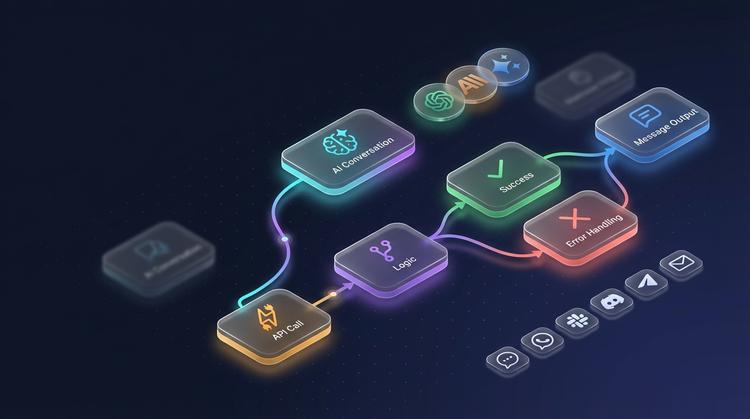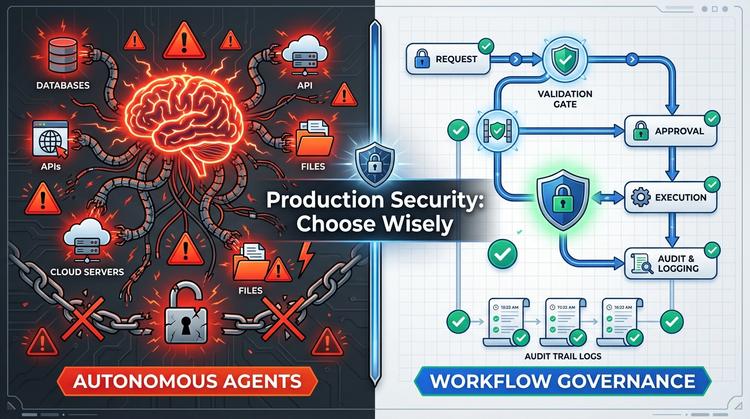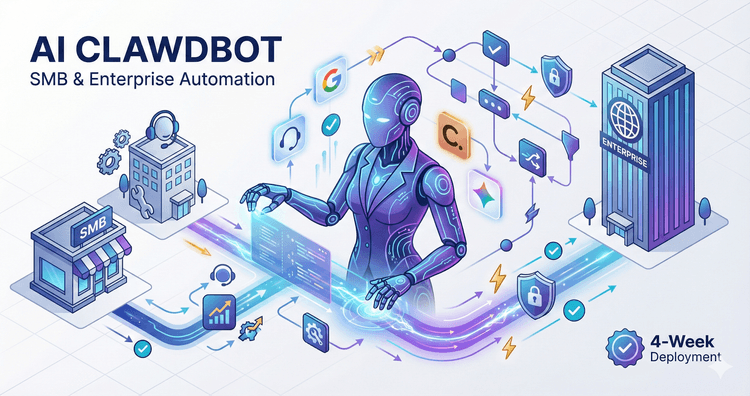Building a Customized AI Sales Agent with Your Own Knowledge Base
Emma Ke
on December 22, 2024CMO
17 min read
Implementing an AI sales agent offers immediate benefits. You can expect a 27% boost in CSAT scores due to efficient, personalized service. AI agents handle inquiries 24/7, ensuring consistent support and stronger customer relationships. Additionally, AI agents have the potential to increase sales leads by 50%. A customized AI agent transforms your sales processes by automating tasks and providing real-time assistance. The integration of a knowledge base enhances AI capabilities, allowing it to deliver accurate and relevant responses. This results in a significant 38% increase in profitability by 2035.
Key Takeaways
- Implementing an AI sales agent can boost customer satisfaction scores by 27% through efficient and personalized service.
- AI sales agents can operate 24/7, providing consistent support and enhancing customer relationships.
- Integrating a knowledge base with your AI agent allows for accurate and relevant responses, leading to a projected 38% increase in profitability by 2035.
- To build an effective AI sales agent, start by defining clear sales goals and selecting the right AI platform and tools.
- Regularly update and maintain your AI system to ensure it remains effective and aligned with evolving customer needs.
- Utilize AI Actions to automate tasks like lead generation and customer engagement, significantly improving productivity.
- Incorporate features like real-time assistance and dynamic suggested questions to enhance customer interactions and satisfaction.
What Are AI Sales Agents?
AI sales agents represent a significant advancement in the realm of digital customer interaction. These agents are not just simple chatbots; they are sophisticated, autonomous applications designed to execute complex tasks and enhance sales processes. By leveraging machine learning and natural language processing, AI sales agents engage customers in human-like conversations, improving efficiency and conversion rates.
AI Chatbot vs AI Sales Agent
While both AI chatbots and AI sales agents utilize artificial intelligence to interact with customers, they serve different purposes. An AI-powered chatbot primarily focuses on enabling prospects and customers to self-serve through pre-programmed conversation flows. It uses natural language processing and machine learning to provide basic customer service and sales support.
In contrast, an AI sales agent goes beyond these capabilities. It acts as a proactive, autonomous entity that can handle tasks like lead qualification and follow-ups. AI sales agents rely on business-specific data to offer personalized and relevant interactions. They can escalate issues when necessary and provide real-time assistance, making them invaluable assets to sales teams.
AI Agent
An AI agent, such as an AI sales agent, functions as a smart software program. It simulates natural, human-like conversations with customers, enhancing the overall customer experience. These agents integrate seamlessly with your business's knowledge base, allowing them to deliver accurate and relevant responses to customer inquiries. By doing so, they boost efficiency and improve conversion rates, ultimately contributing to increased profitability.
AI agents, like those powered by AI Actions, transform chatbots into intelligent agents capable of performing a wide range of tasks. Through API calls, these agents manage subscriptions, track shipments, schedule appointments, and more. This capability allows businesses to automate various functions, providing exceptional customer experiences and driving business success.
Features to Look Out For in a Sales Chatbot
AI-Powered Product Recommendations
When you integrate AI-powered product recommendations into your sales chatbot, you enhance the shopping experience for your customers. These chatbots analyze customer behavior and preferences to suggest products that align with their needs. By doing so, they not only promote relevant items but also increase the likelihood of cross-selling and upselling opportunities. This feature ensures that your customers receive personalized suggestions, which can lead to higher conversion rates and improved customer satisfaction.
Real-Time Customer Assistance During the Purchase Journey
Providing real-time customer assistance is crucial in today's fast-paced digital world. Your sales chatbot should be equipped to offer immediate support throughout the customer's purchase journey. This includes answering questions, resolving issues, and guiding customers through the buying process. By offering instant assistance, your chatbot can reduce cart abandonment rates and enhance the overall shopping experience. Customers appreciate quick responses and problem-solving capabilities, which can significantly boost their trust and loyalty to your brand.
Seamless Integration with E-Commerce Platforms
For a sales chatbot to be truly effective, it must offer seamless integration with e-commerce platforms. This integration allows the chatbot to access real-time inventory data, process transactions, and update order statuses. By connecting with your existing e-commerce systems, the chatbot can provide accurate information and streamline the purchasing process. This feature not only improves operational efficiency but also ensures that customers receive up-to-date information about product availability and delivery timelines.
Natural Language Understanding (NLU)
Natural Language Understanding (NLU) is a crucial feature for any AI-powered chatbot. It enables the chatbot to comprehend and interpret human language accurately. With NLU, your sales chatbot can understand customer queries, even if they are phrased in various ways. This capability allows the chatbot to provide precise and relevant responses, enhancing the overall customer experience. By leveraging NLU, your chatbot can engage in more meaningful conversations, addressing customer needs effectively and efficiently.
24/7 Availability with Human-Like Responsiveness
Your sales chatbot should be available around the clock, providing support whenever your customers need it. With 24/7 availability, your chatbot can handle inquiries outside of regular business hours, ensuring that no customer is left waiting. This constant presence helps build stronger customer relationships and trust. Moreover, the chatbot's human-like responsiveness ensures that interactions feel natural and engaging. Customers appreciate quick and accurate responses, which can lead to increased satisfaction and loyalty.
Trained by Your Own Knowledge Company's Knowledge Base
Training your chatbot with your company's knowledge base is essential for delivering personalized and accurate customer interactions. By integrating your knowledge base, the chatbot can access a wealth of information specific to your products and services. This integration allows the chatbot to provide detailed and relevant answers to customer inquiries, improving the overall support experience. Additionally, a well-trained chatbot can handle complex queries and escalate issues to human agents when necessary, ensuring that customers receive the best possible assistance.
How to Build an AI Sales Agent
Building an AI sales agent requires following several essential steps to ensure it successfully addresses your company's requirements. The process is more straightforward than many assume, with success primarily depending on selecting appropriate tools that align with your goals.
To illustrate this process, let's walk through creating a conversational AI sales agent that functions as a digital assistant for an online retail platform. We'll utilize Chat Data, a comprehensive solution specifically designed for developing AI conversational agents featuring both text and voice interaction capabilities that generate measurable outcomes.
The sales agent will be equipped with these core functionalities:
- Smart Product Suggestions: Recommend merchandise through conversation analysis.
- Revenue Enhancement Features: Present package deals, upgraded options, and related merchandise.
- Inventory Management Integration: Maintain current product availability through automatic synchronization.
- Support Team Integration: Intelligently transfer complex inquiries to human representatives when the AI encounters requests outside its training scope.
- Speech Recognition Capability: Process and respond to verbal communications to ensure accessibility for all users.
With this vision in mind, let's get started and bring your AI sales agent to life!
Defining Sales Goals and Objectives
Start by clearly defining your sales goals and objectives. Determine what you want your AI sales agent to achieve. Do you aim to increase lead generation, improve customer service, or boost conversion rates? Establishing clear objectives will guide the development process and ensure your AI agent aligns with your business strategy. Consider the specific tasks you want the agent to perform, such as answering FAQs, providing product recommendations, or managing customer inquiries.
Step 1: Sign Up With Chat Data
Log into your Chat Data account, and navigate to the Create Chatbot section found under the Product tab or click the Build Your Chatbot button on the homepage. This will redirect you to the My Chatbots page. Here, start by clicking the New Chatbot button to begin the chatbot creation process.

Step 2: Add Data Sources to Your Sales AI Agent
Utilize Local Data
Opt to train your chatbot using data stored on your computer. Simply navigate to the file upload feature, select the desired file from your device, click the eye icon to modify the text extracted from the file and initiate the training process by click on the Create Chatbot button.
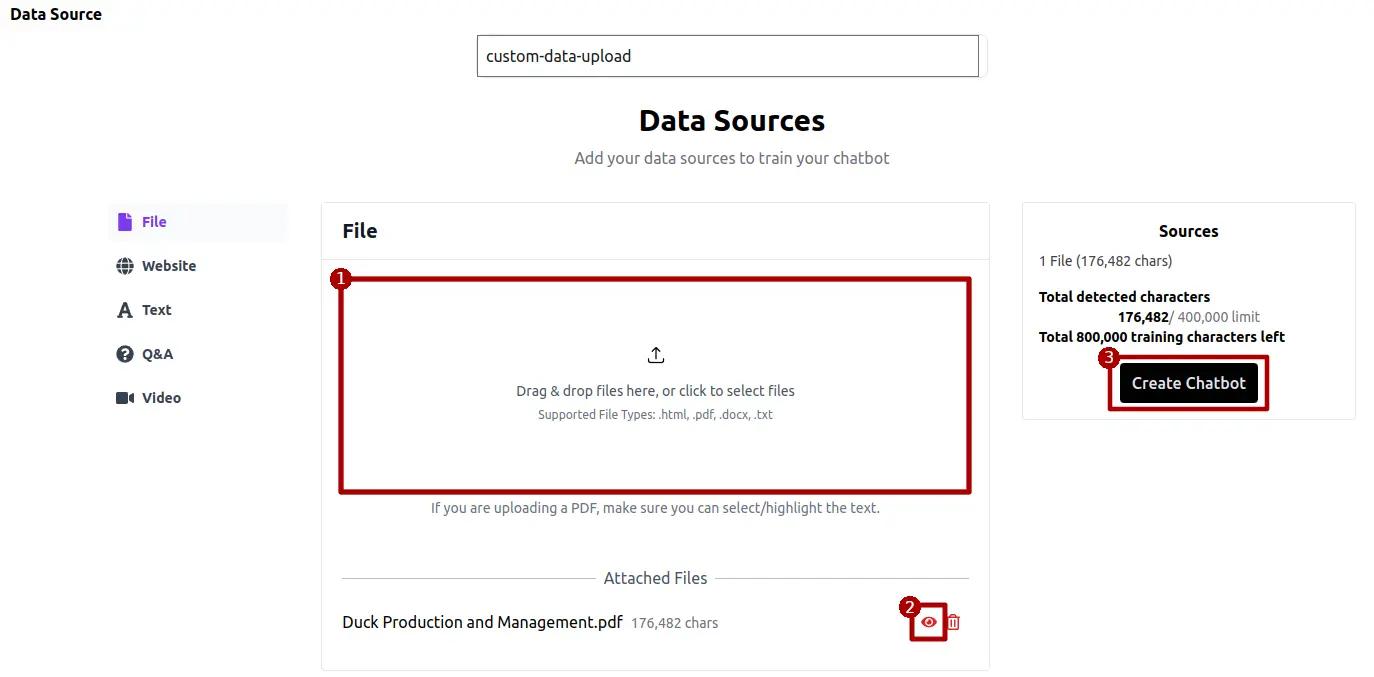
Website Data Integration
Unlock the potential of your website's data by selecting the Website option on the left sidebar. Input the website URL into the designated field at the center of the page and initiate the data retrieval process by clicking on Fetch more links. This will crawl through all websites sharing the prefix of the URLs from the previous level. Once the process is complete, users can review and edit the extracted text by clicking the eye icon. If satisfied, users can proceed to create their chatbot.
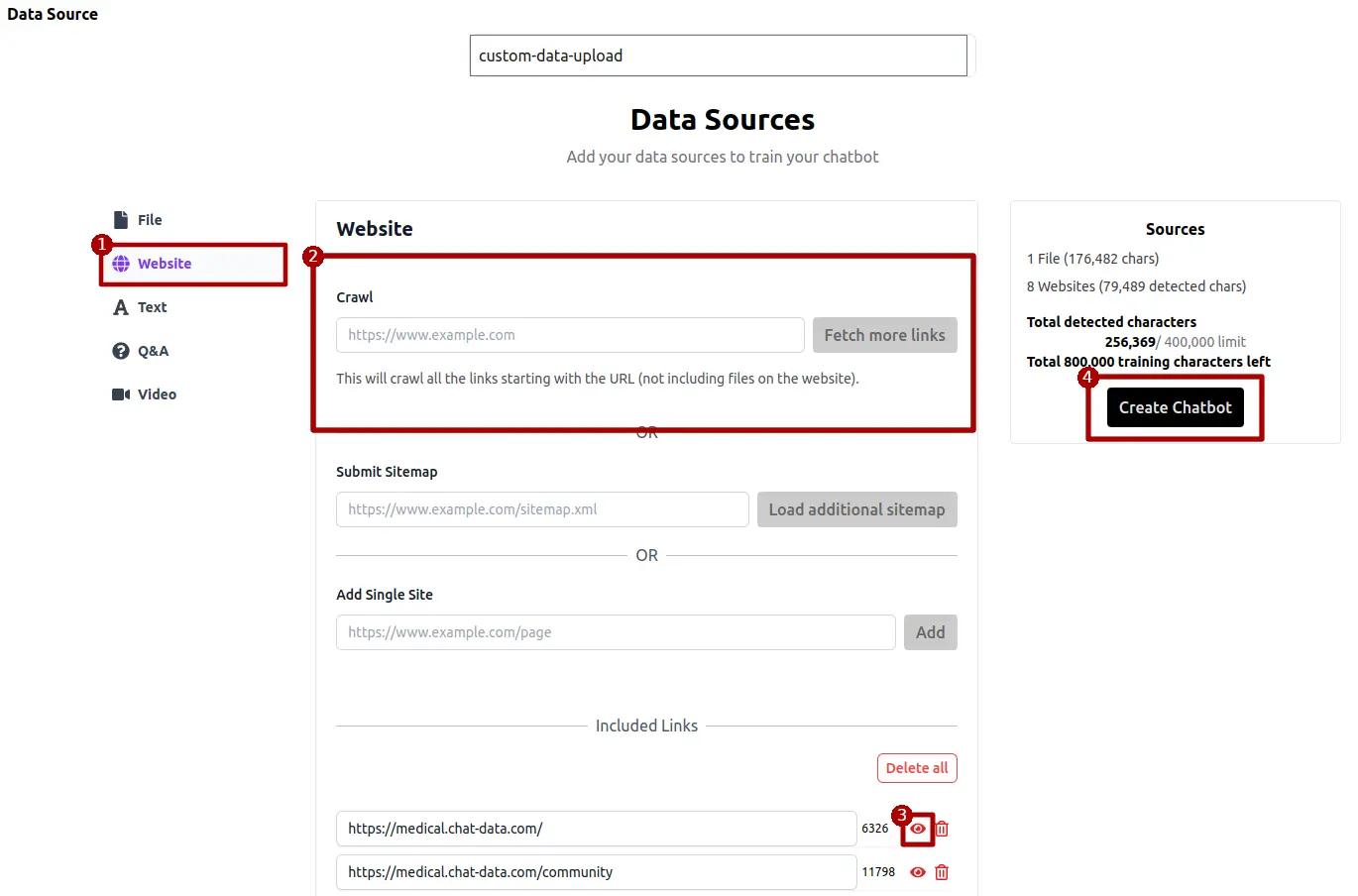
Use Text Data
For users preferring manual input or leveraging copied data, access the Text feature on the left sidebar. Here, users can type or paste relevant training data into the designated text area before proceeding to create their chatbot.
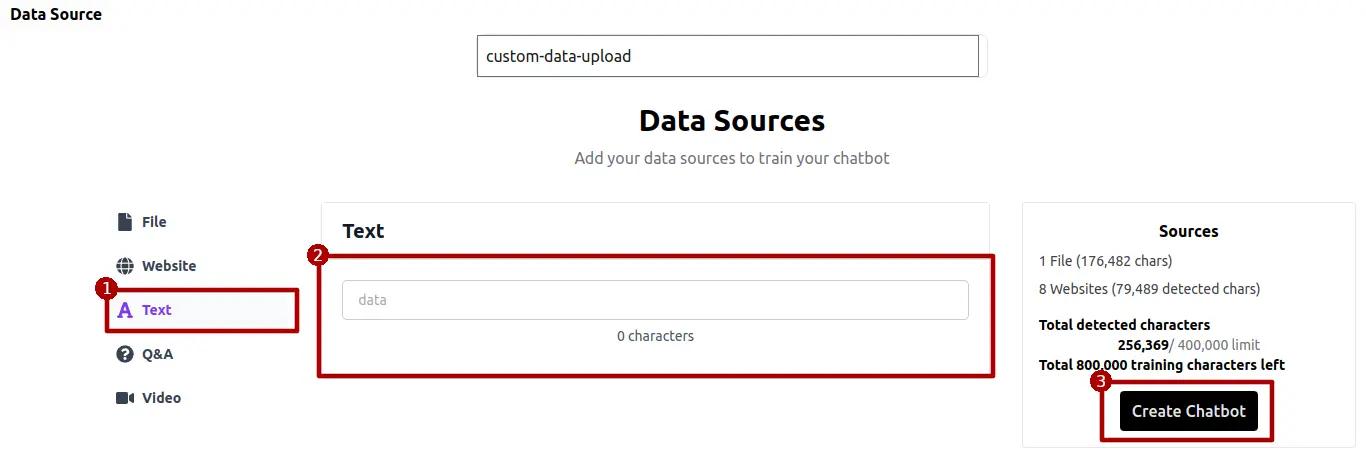
Manual Question and Answer Entry
For meticulous customization, opt to manually input questions and corresponding answers. Navigate to the Q&A section on the left sidebar, click on Add to reveal fields for question and answer input, populate the fields accordingly, and finalize the creation of your chatbot.
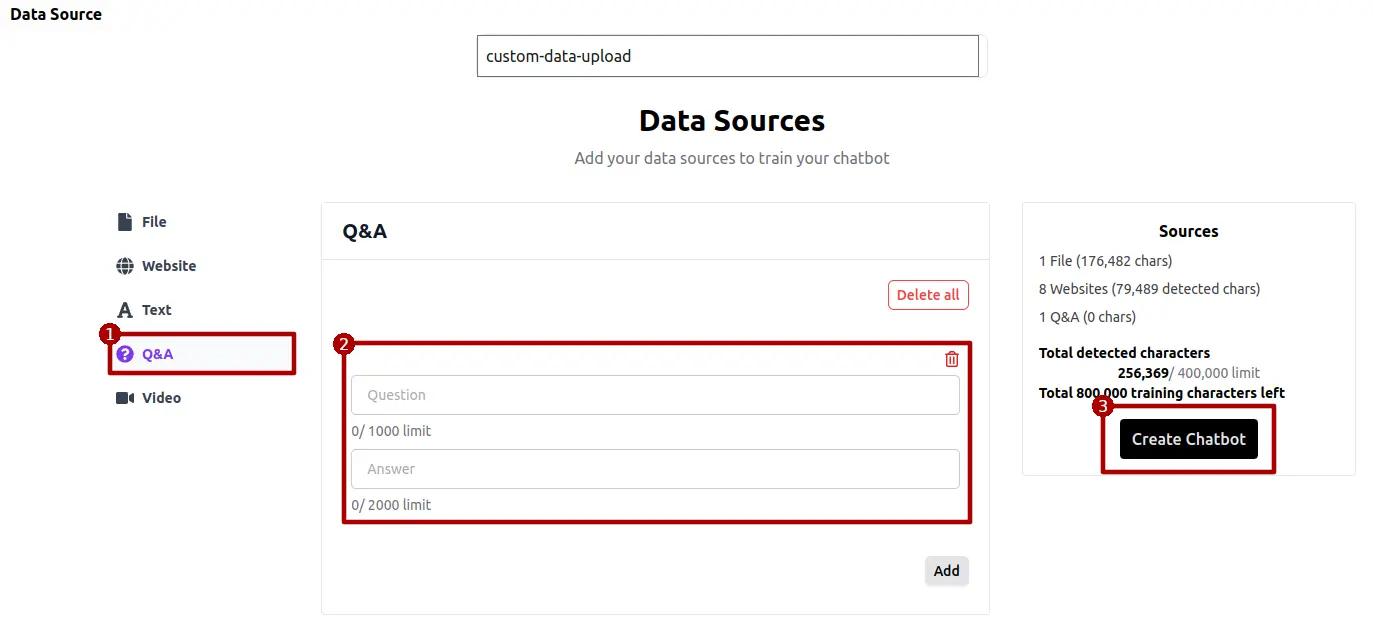
Audio or Video Integration
Similar to training with websites or files, you can extract text from the audio stream of videos or audios. Once the texts are extracted, you can review and edit them by clicking the eye icon. If satisfied, proceed to create your chatbot by clicking the Create Chatbot button.
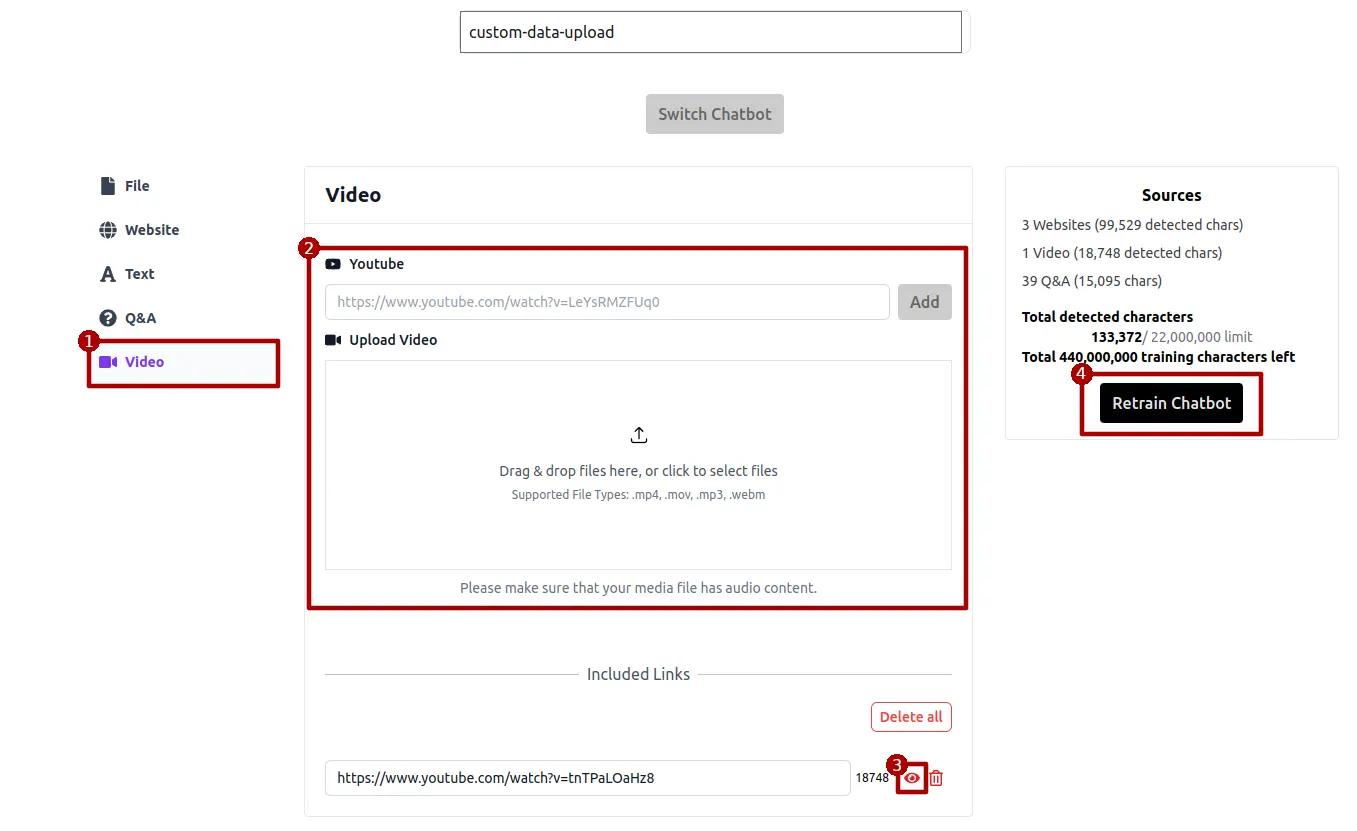
Taking Your AI Agent to the Next Level
Activate Actions in Chat Data
To elevate your AI sales agent's capabilities, you should activate AI Actions within Chat Data. This feature transforms your chatbot into an intelligent agent capable of executing a wide range of tasks through API calls. By doing so, your AI agent can manage subscriptions, track shipments, and schedule appointments, among other functions.
- Configure AI Actions: Begin by setting up AI Actions within the Chat Data platform. You can also choose from a variety of pre-configured actions that suit your business needs or create your own custom actions via API calls.
- Create a Prompt: Develop a prompt that instructs the AI agent on when and how to execute the desired actions. This ensures that your agent operates efficiently and meets your business objectives.
- Let the AI Agent Take Over: Once configured, your AI agent will handle tasks on behalf of your customers, providing an exceptional user experience. This automation allows your business to focus on more strategic activities, enhancing productivity and customer satisfaction.
Turn on Live Chat Escalation Support
Optimize your AI sales agent's capabilities by implementing live chat escalation support. This sophisticated feature enables your AI agent to smoothly transfer complex inquiries to human representatives when required. This ensures optimal customer service delivery, particularly when inquiries extend beyond the AI's current training parameters. This feature is especially valuable for businesses in their early stages, as they may still be developing their knowledge base and unable to address all potential customer queries comprehensively. In such scenarios, customers have the option to escalate their concerns directly to a human representative.
-
Set Up Escalation Triggers: Define specific conditions under which the AI agent should escalate a conversation to a human agent. This might include scenarios where the AI cannot provide a satisfactory answer or when a customer requests human assistance.
-
Integrate with Your Support Team: Ensure that your support team is ready to handle escalated chats. Provide them with the necessary tools and information to resolve customer issues effectively.
By turning on live chat escalation support, you enhance the reliability and responsiveness of your AI sales agent, building stronger customer relationships and trust.
Turn on Realtime Voice-to-Voice Mode
For a more interactive customer experience, activate the real-time voice-to-voice mode in your AI sales agent. This feature allows your AI agent to engage customers in spoken conversations, simulating a human-like interaction.
- Enable Voice Recognition: Set up voice recognition capabilities within your AI agent. This allows it to understand and respond to spoken queries accurately.
- Provide Clear Audio Responses: Ensure that your AI agent delivers clear and concise audio responses. This enhances the overall customer experience, making interactions feel more personal and engaging.
By turning on real-time voice-to-voice mode, you offer customers a more dynamic and immersive interaction, further differentiating your brand in the competitive market.
Turn on images/files based AI Chatting
Enhance your AI sales agent by enabling images and files-based chatting. This feature allows your AI agent to send and receive images, PDFs, and other file types during conversations. By doing so, you provide a richer and more interactive experience for your customers.
-
Enable File Sharing: Within your AI platform, activate the option for file sharing. This setup allows your AI agent to handle various file formats, enhancing its ability to assist customers with visual or document-based queries.
-
Integrate with APIs: Use APIs to connect your AI agent with external systems that support file sharing. This integration ensures seamless data exchange, allowing your agent to access and share relevant files quickly.
-
Provide Visual Assistance: Equip your AI agent to offer visual assistance by sending images or diagrams that clarify complex information. This capability improves customer understanding and satisfaction.
By turning on images/files based AI chatting, you create a more engaging and informative interaction, helping customers make informed decisions.
Turn on dynamics suggested questions
Activate dynamic suggested questions to enhance your AI sales agent's conversational capabilities. This feature allows your AI agent to propose relevant questions based on the context of the conversation, guiding customers through their inquiries.
-
Set Up Contextual Triggers: Define triggers that prompt your AI agent to suggest questions. These triggers can be based on keywords or phrases commonly used in customer interactions.
-
Utilize Machine Learning: Leverage machine learning algorithms to analyze past conversations and identify patterns. This analysis helps your AI agent generate meaningful and contextually appropriate questions.
-
Improve Customer Engagement: By offering dynamic suggested questions, your AI agent keeps the conversation flowing smoothly. This proactive approach enhances customer engagement and satisfaction.
Implementing dynamic suggested questions ensures that your AI sales agent remains responsive and helpful, providing a seamless customer experience.
Turn on business profile of your shop
To personalize customer interactions further, turn on the business profile feature for your AI sales agent. This feature allows your AI agent to access and share detailed information about your shop, such as location, hours of operation, and special offers.
-
Create a Comprehensive Profile: Develop a detailed business profile that includes essential information about your shop. This profile serves as a valuable resource for your AI agent during customer interactions.
-
Integrate with Your Knowledge Base: Connect your business profile to your AI agent's knowledge base. This integration ensures that your agent can access and share accurate information with customers.
-
Enhance Customer Trust: By providing detailed business information, your AI agent builds trust with customers. This transparency fosters stronger relationships and encourages repeat business.
Turning on the business profile feature equips your AI sales agent to deliver personalized and informative interactions, enhancing the overall customer experience.
Best Practices and Future Opportunities
Maintaining and Updating the AI System
To keep your AI sales agent effective, you must regularly maintain and update it. This involves several key practices:
-
Continuous Monitoring: Regularly monitor your AI agent's performance. Track metrics such as response accuracy, customer satisfaction, and task completion rates. This helps you identify areas for improvement.
-
Data Updates: Keep your knowledge base current. Update it with new product information, customer feedback, and market trends. This ensures your AI agent provides accurate and relevant responses.
-
Feedback Integration: Collect feedback from users interacting with your AI agent. Use this feedback to refine its capabilities. Adjust algorithms and conversation flows based on user experiences.
-
System Upgrades: Implement software updates and enhancements. These upgrades improve the AI agent's functionality and security. Stay informed about the latest AI technologies and incorporate them into your system.
By following these practices, you ensure your AI sales agent remains a valuable asset to your business. Regular maintenance and updates enhance its performance and reliability.
Leveraging AI for Business Growth
AI technology offers significant opportunities for business growth. Here's how you can leverage your AI sales agent to drive success:
-
Enhanced Customer Engagement: Use your AI agent to engage customers in meaningful conversations. With its ability to understand and respond like a human, your AI agent can build stronger relationships with customers.
-
Personalized Interactions: Leverage your AI agent's ability to recall previous interactions. This feature allows for more personalized and context-aware conversations, improving customer satisfaction.
-
Sales Optimization: Focus your AI agent on driving sales. Use it to manage leads, provide product recommendations, and close deals. An AI sales agent doesn't just support; it actively drives results.
-
Scalability: As your business grows, your AI agent can scale with you. It handles increased customer interactions without compromising on quality. This scalability supports your expansion efforts.
-
Data-Driven Insights: Analyze data collected by your AI agent. Use these insights to make informed business decisions. Identify trends, customer preferences, and areas for improvement.
By leveraging AI technology, you position your business for growth and success. Your AI sales agent becomes a powerful tool in achieving your business goals.
Building and integrating an AI sales agent involves a structured process that enhances your business's customer interactions. By defining clear goals, selecting the right tools, and organizing data, you create an agent that aligns with your objectives. Continuous improvement is crucial. Regular updates and feedback integration ensure your AI agent remains effective and relevant. Looking ahead, AI sales technology promises exciting developments. Future advancements may include more sophisticated natural language processing and enhanced decision-making capabilities, further transforming how businesses engage with customers.
FAQ
What is an AI Sales Agent?
An AI sales agent is a sophisticated software application designed to enhance customer interactions and sales processes. Unlike traditional chatbots, AI sales agents use machine learning and natural language processing to engage customers in human-like conversations. They can handle tasks such as lead qualification, follow-ups, and providing real-time assistance, making them invaluable assets for sales teams.
How does an AI Sales Agent differ from a regular chatbot?
While both AI sales agents and chatbots use artificial intelligence to interact with customers, their purposes differ. A chatbot primarily enables self-service through pre-programmed conversation flows. In contrast, an AI sales agent acts as a proactive entity, handling complex tasks like lead qualification and offering personalized interactions based on business-specific data.
What are the benefits of using AI Actions in my AI Sales Agent?
AI Actions transforms your chatbot into an intelligent agent capable of performing tasks through API calls. This feature allows your AI agent to manage subscriptions, track shipments, schedule appointments, and more. By automating these functions, AI Actions enhances productivity and customer satisfaction, providing an exceptional user experience.
How do I set up AI Actions for my chatbot?
Setting up AI Actions involves three simple steps:
- Configure your API within Chat Data or choose from available pre-configured actions.
- Create a prompt that instructs the AI Agent on when and how to execute actions.
- Let the AI Agent handle everything else, performing actions on behalf of your customers.
Can AI Sales Agents improve customer satisfaction?
Yes, AI sales agents can significantly boost customer satisfaction. They provide 24/7 support, ensuring that customers receive assistance whenever needed. With their ability to deliver personalized and accurate responses, AI sales agents enhance the overall customer experience, leading to stronger relationships and increased loyalty.
How do AI Sales Agents integrate with a knowledge base?
AI sales agents integrate with a knowledge base by connecting data sources through APIs. This integration allows the AI agent to access real-time information, enhancing its ability to provide relevant responses. By structuring and connecting data sources effectively, you empower your AI agent to deliver exceptional customer experiences.
What are some best practices for maintaining an AI Sales Agent?
To maintain an AI sales agent effectively, you should:
- Regularly monitor its performance and track metrics like response accuracy and customer satisfaction.
- Keep your knowledge base updated with new product information and customer feedback.
- Collect user feedback and refine the agent's capabilities based on this input.
- Implement software updates and enhancements to improve functionality and security.
How can AI Sales Agents drive business growth?
AI sales agents drive business growth by enhancing customer engagement, personalizing interactions, and optimizing sales processes. They handle increased customer interactions without compromising quality, supporting scalability. Additionally, AI agents provide data-driven insights that help businesses make informed decisions and identify trends.
Are AI Sales Agents suitable for all industries?
Yes, AI sales agents are versatile and can be used across various industries. They automate repetitive tasks, improve decision-making through data analysis, and increase overall efficiency. Whether in retail, healthcare, finance, or any other sector, AI sales agents offer smarter, more efficient ways to manage tasks and enhance customer interactions.
What future opportunities exist for AI Sales Agents?
The future of AI sales agents is promising. They will continue to revolutionize business operations by acting autonomously and adapting to changing environments in real time. Future advancements may include more sophisticated natural language processing and enhanced decision-making capabilities, further transforming how businesses engage with customers.
